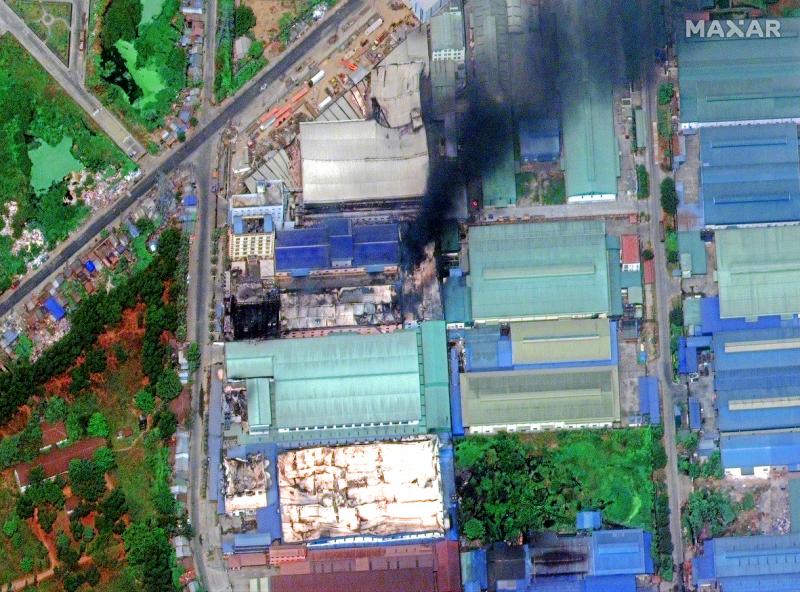With Chinese-owned factories torched and workers hunkered down under martial law, Beijing is being pulled into the ulcerous crisis in Myanmar, an unraveling country it had carefully stitched into its big plans for Asia.
During a visit to Myanmar in January last year, Chinese President Xi Jinping (習近平) elevated the Southeast Asian neighbor to “country of shared destiny” status, Beijing’s highest diplomatic stripe.
The aim was to nudge Myanmar decisively toward China — and away from the US — and drive through billions of dollars of projects under the Belt and Road Initiative, including an oil and gas pipeline, and an Indian Ocean port.

Photo: AP
Fast-forward one year, and the strategically located country has tipped into bloody chaos after the Burmese military, or Tatmadaw, in a coup took out the civilian government of Burmese State Counselor Aung San Suu Kyi.
The democracy movement which has since unfurled accuses China of waving through the generals’ power grab and trading Myanmar’s freedom for its own strategic gain. As Burmese security forces kill protesters — nearly 150 so far — Beijing faces a dilemma: back the men with guns or side with an increasingly anti-China public.
“China doesn’t really care who is in government, but it wants a government that will protect Chinese projects and interests,” said Richard Horsey, an expert on Burmese politics. “This is a military that Beijing doesn’t think can bring stability ... and the more China tries to build a relationship with that regime, the more the public will be put offside.”
That is laden with danger for Chinese interests.
At least 32 Chinese-owned textile factories on Sunday were burned down in several townships of Myanmar’s biggest city of Yangon, causing about US$37 million of damage, Chinese state media reported.
A Chinese Ministry of Foreign Affairs spokesman demanded the immediate protection of “Chinese institutions and personnel.”
On Tuesday, Chinese businesses were closed in the flashpoint areas, leaving workers holed up in a “hostile environment” cloaked by martial law, a representative of a garment factory in Yangon’s Shwepyitar Township said.
“All Chinese staff are staying inside the factory [and] some police have also been stationed there,” the spokesperson said, requesting anonymity.
Ominous commentaries have since seeped out of Chinese media, with one saying that Beijing could be prodded “into taking more drastic action ... if the authorities cannot deliver and the chaos continues.”
Twitter accounts of Myanmar democracy groups allege — without offering clear proof — that the military carried out the factory attacks to justify a crackdown in which dozens of protesters died.
Ripples of anti-China sentiment in Myanmar could become waves across a Southeast Asian region suspicious of China’s reach, influence and penchant for debt-trap diplomacy to get its projects over the line.
“Any broad-based popular uprising against Chinese interests can be contagious and percolate anti-China grievances through Cambodia, Laos and elsewhere,” said Thitinan Pongsudhirak, a political science professor at Chulalongkorn University in Bangkok.
“China had figured out this piece [Myanmar] of its geostrategic puzzle,” but now there is “no easy play ahead,” he said.
In Myanmar, public anger at Chinese projects has ended major investments before.
Construction of a US$3.6 billion Myitsone Dam in northern Kachin State was spiked a decade ago after widespread opposition, while the voracious Chinese market for rare wood, jade and rubies is routinely blamed by the public for driving the resource grab inside Myanmar.
However, alongside economic interests, China also craves the legitimacy of global leadership and “can’t turn a blind eye to a dark dictatorship” on its doorstep, Thitinan said.
Beijing enjoys exceptional leverage over Myanmar, but it has so far refused to label the military action a coup.
China is the country’s leading foreign investor and supplies the military with hardware.
Observers say that it also maintains alliances with ethnic militias on the long Myanmar-China border, who have been fighting the army for decades.
China has denied any advance knowledge of the Feb. 1 coup, and its official position so far has been to call for de-escalation, while supporting “all sides” in Myanmar’s post-coup crisis.
On Thursday last week, it signed a UN Security Council statement strongly condemning violence against protesters — a rare act by Beijing, which has previously shielded Myanmar at the UN over alleged genocide against the Rohingya minority.
Still, China remains a potential referee, said Soe Myint Aung, a political analyst from the Yangon Center for Independent Research.
“China can play a direct or indirect mediating role for a negotiated compromise,” he said.
First, it would have to chip back at the anger and suspicion in Myanmar.
Anti-Beijing placards are common at protests, and there are rumors of Chinese military flights, while the Internet grumbles with memes urging a boycott of everything Chinese, from video games to Huawei smartphones and TikTok.
“China babysits the Tatmadaw. It is the backbone of disruption in our country,” one democracy supporter said in Yangon, requesting anonymity. “China has dug up our jade and jewels, taken our oil, and now it wants to cut our country in half with its pipeline.”

Philippine President Ferdinand Marcos Jr has fired his national police chief, who gained attention for leading the separate arrests of former Philippine president Rodrigo Duterte on orders of the International Criminal Court and televangelist Apollo Carreon Quiboloy, who is on the FBI’s most-wanted list for alleged child sex trafficking. Philippine Executive Secretary Lucas Bersamin did not cite a reason for the removal of General Nicolas Torre as head of the 232,000-member national police force, a position he was appointed to by Marcos in May and which he would have held until 2027. He was replaced by another senior police general, Jose

POWER CONFLICT: The US president threatened to deploy National Guards in Baltimore. US media reports said he is also planning to station troops in Chicago US President Donald Trump on Sunday threatened to deploy National Guard troops to yet another Democratic stronghold, the Maryland city of Baltimore, as he seeks to expand his crackdown on crime and immigration. The Republican’s latest online rant about an “out of control, crime-ridden” city comes as Democratic state leaders — including Maryland Governor Wes Moore — line up to berate Trump on a high-profile political stage. Trump this month deployed the National Guard to the streets of Washington, in a widely criticized show of force the president said amounts to a federal takeover of US capital policing. The Guard began carrying

Ukrainian drone attacks overnight on several Russian power and energy facilities forced capacity reduction at the Kursk Nuclear Power Plant and set a fuel export terminal in Ust-Luga on fire, Russian officials said yesterday. A drone attack on the Kursk nuclear plant, not far from the border with Ukraine, damaged an auxiliary transformer and led to 50 percent reduction in the operating capacity at unit three of the plant, the plant’s press service said. There were no injuries and a fire sparked by the attack was promptly extinguished, the plant said. Radiation levels at the site and in the surrounding

‘DELIBERATE PROVOCATION’: Pyongyang said that Seoul had used a machine gun to fire at North Korean troops who were working to permanently seal the southern border South Korea fired warning shots at North Korean soldiers that briefly crossed the heavily fortified border earlier this week, Seoul said yesterday after Pyongyang accused it of risking “uncontrollable” tensions. South Korean President Lee Jae-myung has sought warmer ties with the nuclear-armed North and vowed to build “military trust,” but Pyongyang has said it has no interest in improving relations with Seoul. Seoul’s military said several North Korean soldiers crossed the border on Tuesday while working in the heavily mined demilitarized zone (DMZ) separating the two Koreas. The incursion prompted “our military to fire warning shots,” South Korea’s Joint Chiefs of Staff